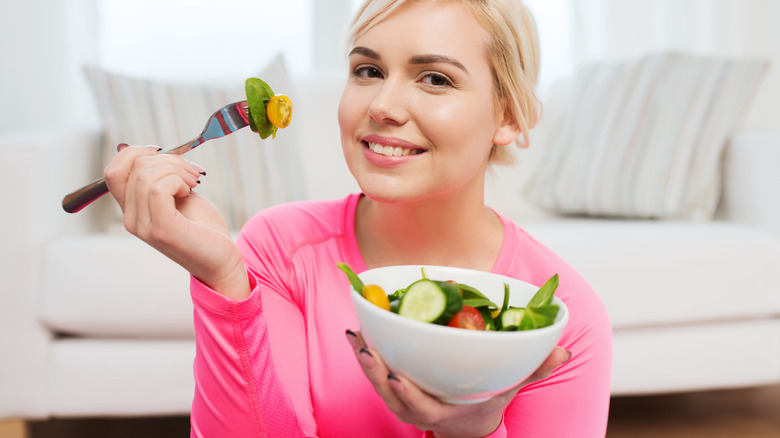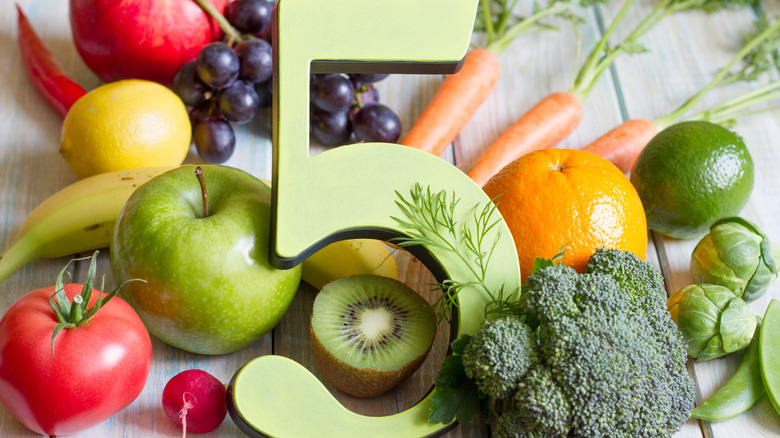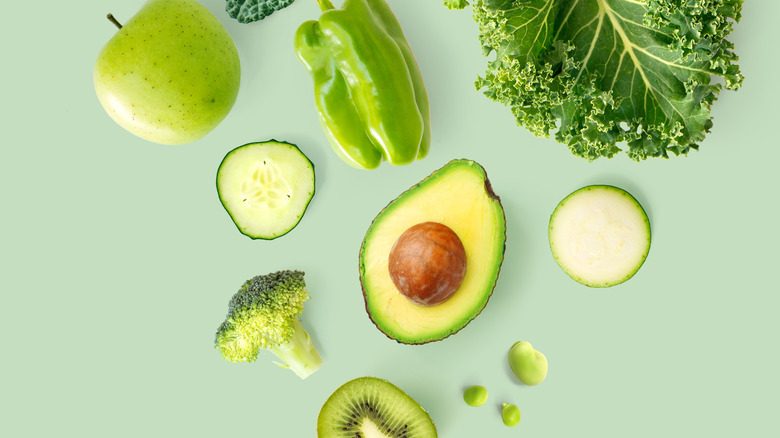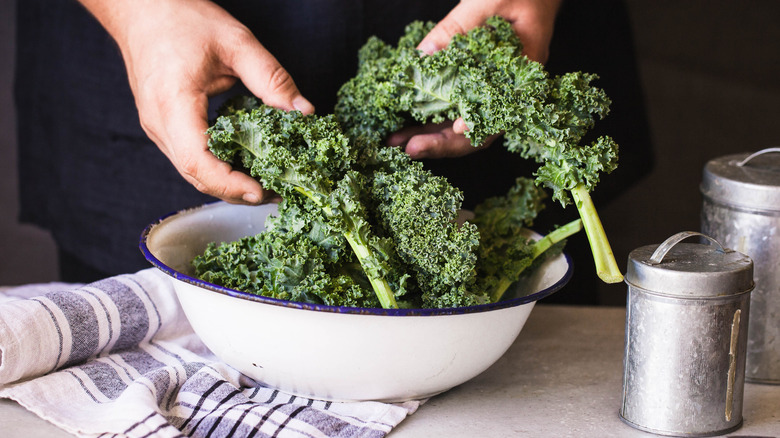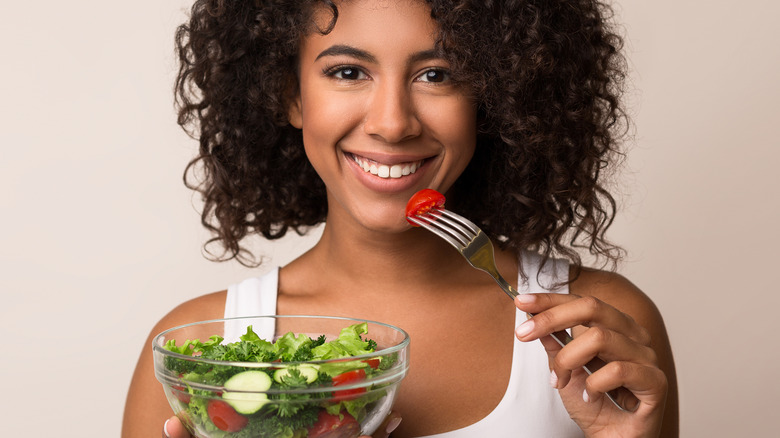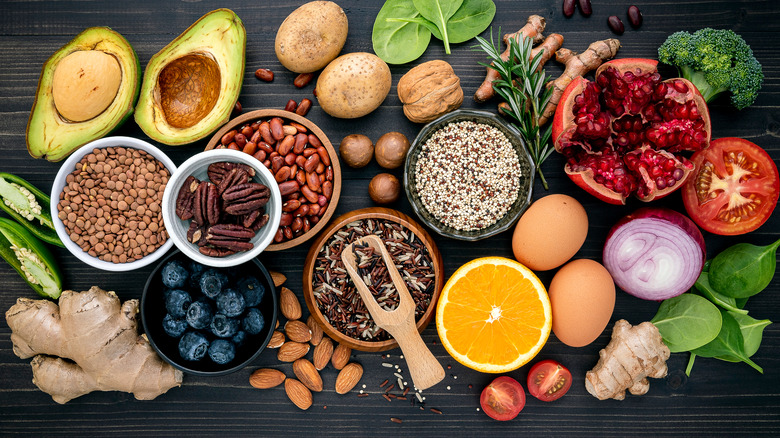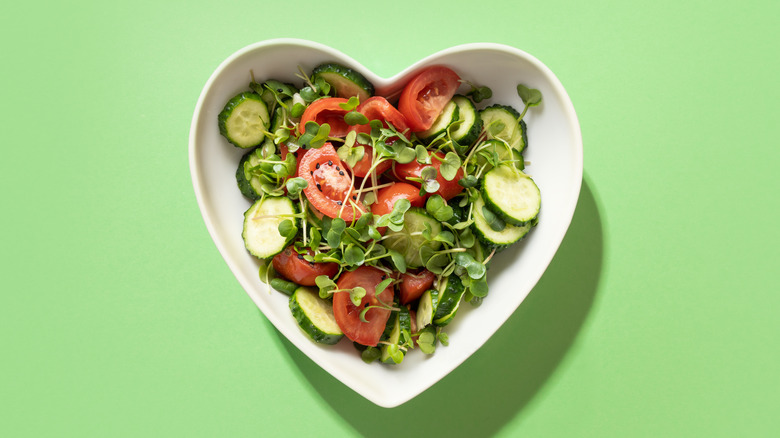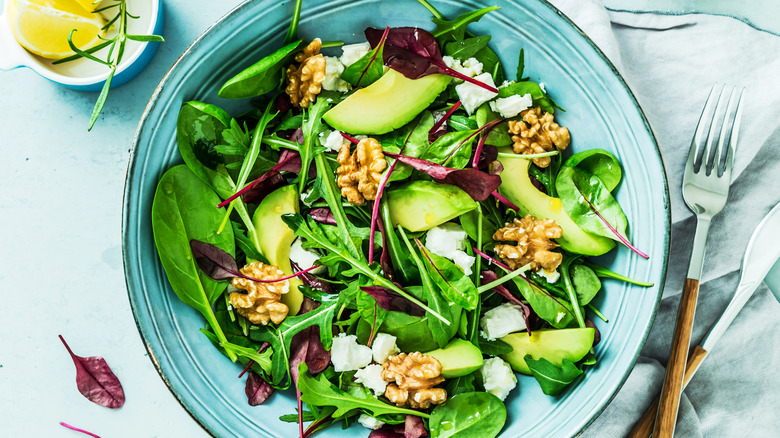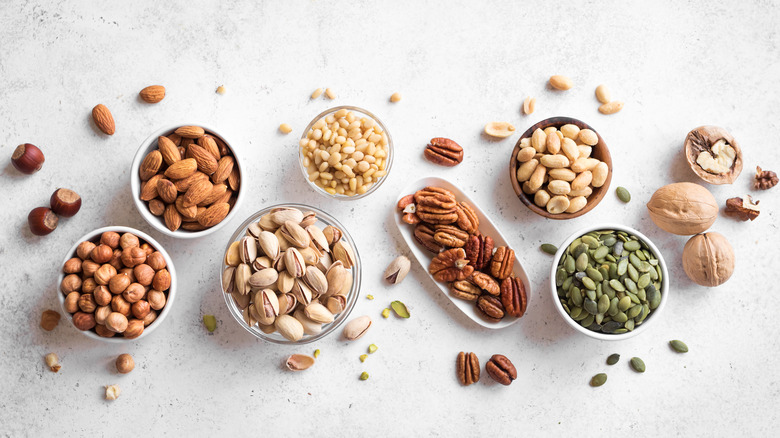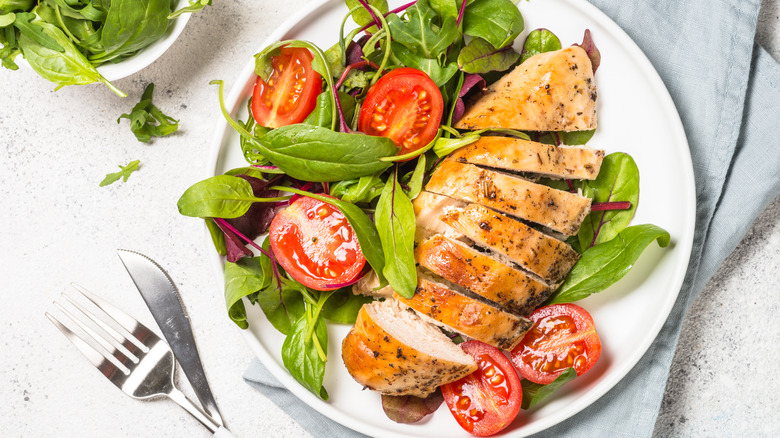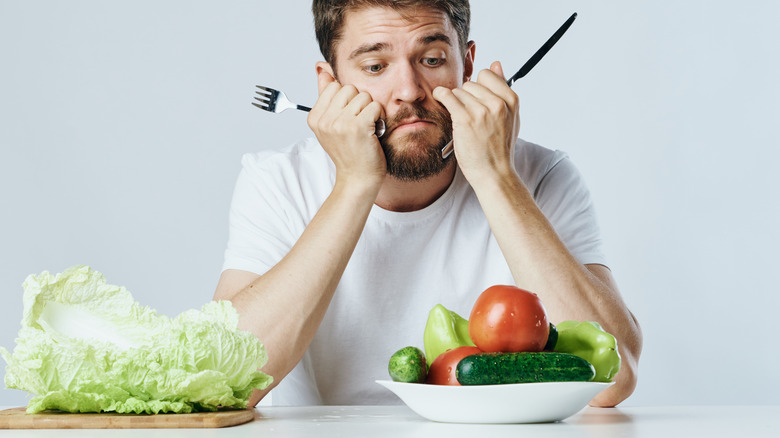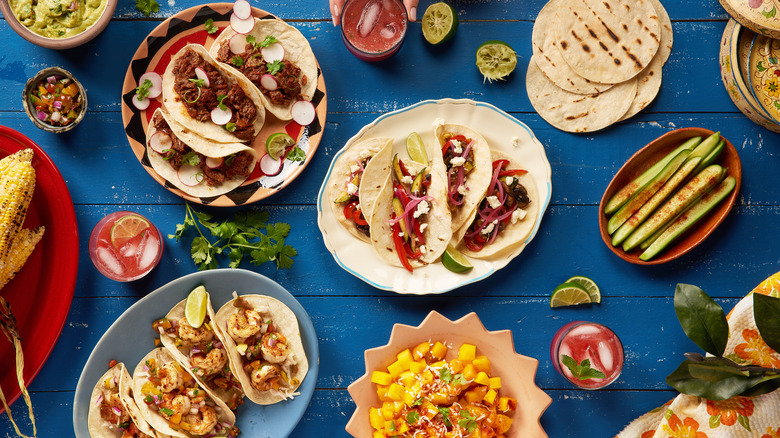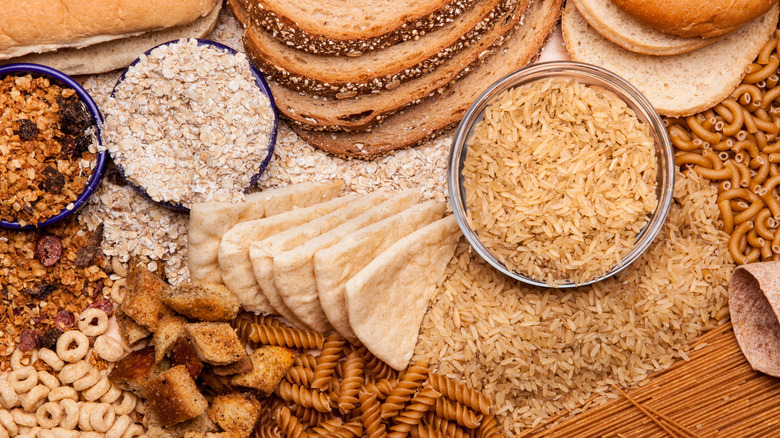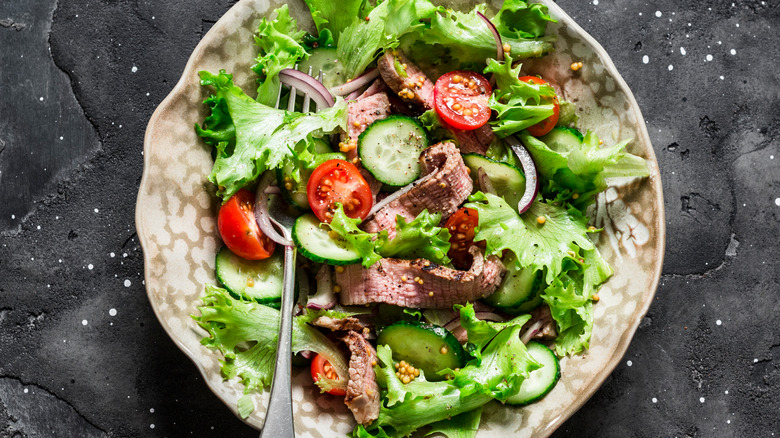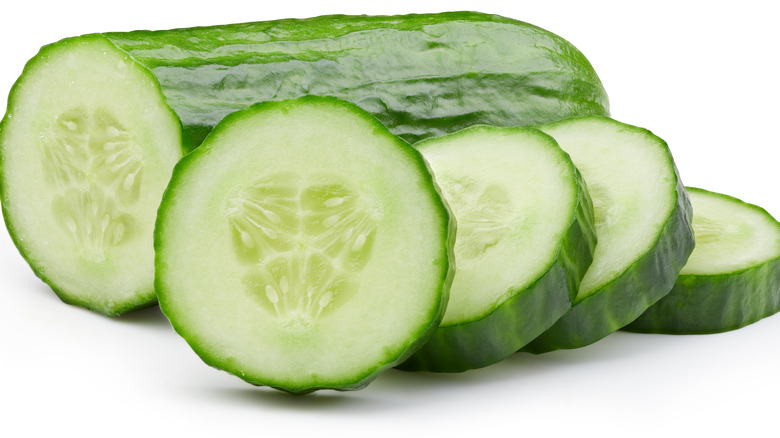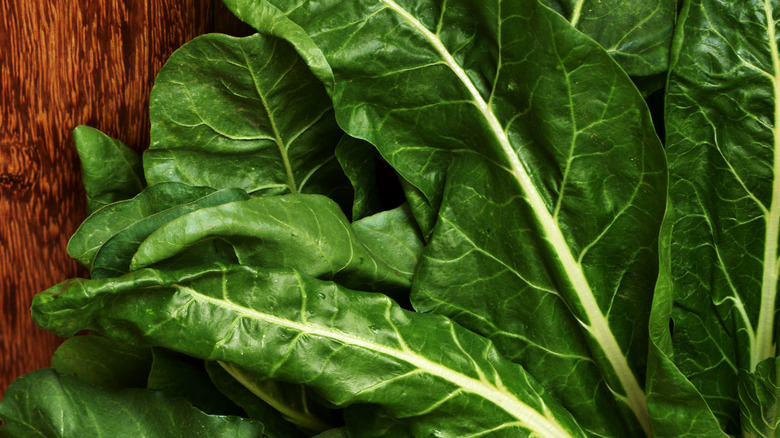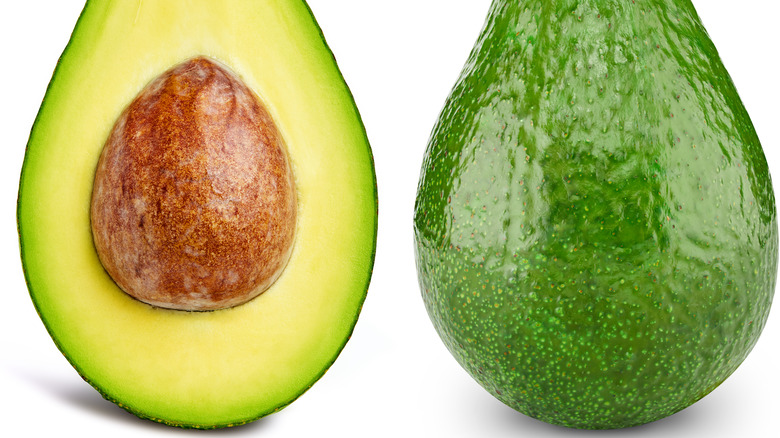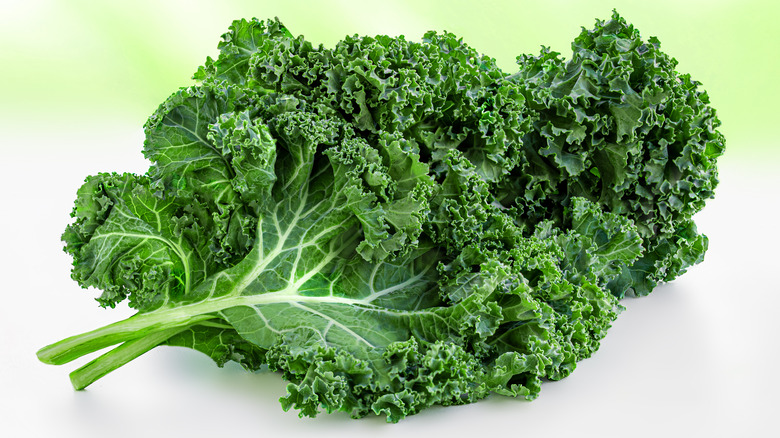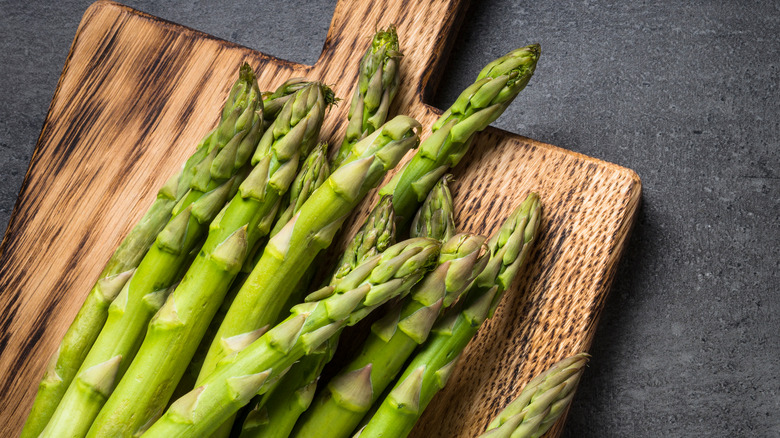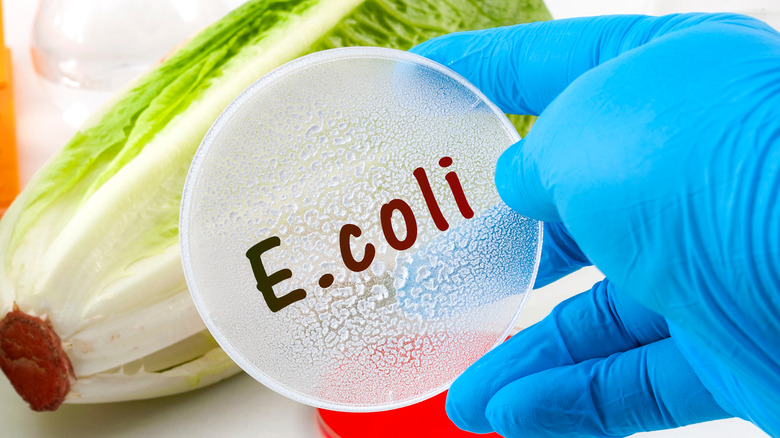When You Only Eat Salad Every Day, Here's What Happens To Your Body
You may think eating salads every day is the best thing you can do for your body. We can see why, as practically all nutrition experts agree that eating fruits and vegetables every day can significantly improve a person's health. In fact, the first two recommendations for a healthy eating pattern in the 2015-2020 Dietary Guidelines for Americans are to eat a variety of vegetables, and to eat fruit (especially whole fruit). These guidelines, which take into account all existing nutrition research and are updated every five years, explain that "vegetables and fruits are associated with a reduced risk of many chronic diseases, including [heart disease], and may be protective against certain types of cancers."
Eating only salad every day would certainly mean getting in plenty of fruits and vegetables at every meal. And, because fruits and vegetables are high in fiber and relatively low in calories, it's reasonable to think that eating only salad might help you eat fewer calories over all. A study published in The New England Journal of Medicine backs this up, finding that high-fiber, low-calorie diets are associated with weight loss and maintaining a lower BMI (via Scientific American). But, is it really a good idea to eat only salad every day?
Eating salad every day will help you get your five a day
The 2015-2020 Dietary Guidelines for Americans recommend that adults eat five servings of fruits and vegetables per day. (For reference, they measure one serving is one cup of leafy greens, one-half cup of other vegetables, one half-cup of fresh fruit, or one-half cup of dried fruit.) Unfortunately, the Centers for Disease Control and Prevention (CDC) report that only one in ten American adults actually eat their "five a day." Seung Hee Lee Kwan, a CDC nutrition researcher, said in the report, "As a result, we're missing out on the essential vitamins, minerals, and fiber that fruits and vegetables provide."
Eating only salad every day would almost certainly guarantee you five servings of fruits and vegetables per day. Think about it: Two cups of leafy greens plus half a cup each of tomatoes, cucumbers, and chopped apple would make a reasonable base for a lunchtime salad, and delivers all five of the recommended daily servings of fruits and vegetables. Even if you were to eat a salad half that size at every meal, you'd get more than enough fruits and vegetables in daily.
The fruits and vegetables you put in your salad reduce your risk of chronic disease
Eating only salad every day would boost your vegetable consumption, since salads are inherently rich in vegetables (unless you're only eating things like chicken salad, egg salad, and ambrosia salad, which may contain no vegetables at all and aren't really what we're talking about here). You'd probably be eating more fruit, too, since things like raisins, strawberries, and chopped apples add a little sweetness to salads. In other words, eating only salad means eating tons of fruits and vegetables. And fruits and vegetables are undeniably healthy.
According to the United Kingdom's National Health Service, fruits and veggies are a good source of important vitamins and minerals, and are a good source of dietary fiber. They can also help reduce your risk of heart disease, stroke, and some types of cancer. Harvard Health explains that while "no single fruit or vegetable" will provide all the nutrients you need for good health and reduced disease risk, a variety of different fruits and vegetables each day can do the trick.
Leafy green vegetables — the base of most salads — are especially good for the body
If you're eating only salad every day you're probably eating loads of leafy green vegetables, since foods like lettuce, spinach, kale, and arugula form the base of most salads. That's great news for your health. A 2016 meta-analysis published in JRSM Cardiovascular Disease found that eating more leafy green vegetables was associated with a significantly lower risk of heart disease across eight previous studies conducted in several different regions of the world.
Leafy greens aren't just good for your heart. A 2018 observational study published in Neurology found that eating more leafy green vegetables was associated with slower cognitive (brain function) decline, and that study subjects who ate the most leafy green vegetables experienced cognitive decline at a rate equivalent to being 11 years younger in cognitive age than those who ate the least leafy greens. This preliminary research warrants further study, but the potential brain benefits of leafy greens should be enough to have you reaching for more of them every day.
Your daily salads are great for your digestion
One of the reasons that fruits and vegetables are so healthy is that they are rich in fiber, a compound found in plant foods that your body can't digest and absorb. There are two types of fiber: soluble and insoluble. Soluble fiber turns into a gel when mixed with water and can help lower blood cholesterol and blood sugar. Insoluble fiber helps move food through your digestive system, which helps bulk up your stool (yes, poop) and prevent diarrhea (via Mayo Clinic).
Eating only salad every day means you'll almost certainly get at least the recommended daily amount of fiber, which is 25 grams per day for women and 38 grams per day for men 50 years of age or younger. The insoluble fiber found in vegetables like cauliflower, green beans, potatoes, nuts, and beans will help keep food moving, so that you don't feel too blocked up or bloated during the day.
Evidence shows that insoluble fiber isn't just good for digestive comfort, though. Studies have found that high-fiber diets also lower your risk of colorectal cancer, which could be due to fiber fermenting in your colon having a protective effect, the Mayo Clinic explained.
Eating salad helps with blood sugar control
Eating only salad every day could help improve your blood sugar control. Good blood sugar control can lower your risk of developing the disease. In fact, according to the American College of Cardiology, evidence shows that people who eat the most fiber have an 18 percent lower risk of type 2 diabetes than those who eat the least fiber. If you do have diabetes, the American Diabetes Association recommends getting at least 14 grams of fiber per 1,000 calories to help with blood sugar control and digestion as well as reduce the risk of other chronic diseases.
That said, the best way to ensure good blood sugar control is to eat salads that have more vegetables than fruits. Diabetes UK explained that while fruit can and should absolutely be part of your healthy diet, it's important for those with diabetes, or are at high risk for diabetes, to pay attention to portion sizes, as eating several servings of fruit (which has lots of natural sugar) at once might cause a sharp rise in blood sugar.
Eating salad is good for your heart health
Honestly, fiber almost has too many benefits to count. The big dose of fiber that you would inevitably get from eating only salad every day would not only help with digestion, blood sugar control, and fullness — it might also help reduce your risk of heart disease. The American Heart Association (AHA) explains that eating plenty of fiber can benefit heart health in two ways.
First, high-fiber foods like fruits and vegetables can help you lose weight or maintain weight by helping you feel full on fewer calories, thanks to the fact that it takes up space in your digestive system but can't actually be absorbed. Second, the AHA recommends filling at least half your plate with fruits and vegetables at every meal — which is a no-brainer when you're eating salad — because the vitamins, minerals, and other nutrients in these foods may help prevent heart disease and stroke.
They association further recommends eating at least one serving a day from each of the five main color groups: green, white, orange/yellow, red/pink, and blue/purple. This way, you get as many helpful nutrients as possible.
Healthy fats are a must for your daily salads
Eating only salad every day doesn't mean just eating a pile of fruits and vegetables with nothing on it. Healthy fats are a must in every salad — for a variety of reasons. First, fat helps with the absorption of fat-soluble vitamins found in fruits and vegetables (via ScienceDaily). Without any fat on your salad, many of the vitamins would just pass right through you without being absorbed into your bloodstream.
Second, unsaturated fats are health-promoting in and of themselves. According to the American College of Cardiology, unsaturated fats — those that come from plants, with the exception of coconut oil which is saturated — can help lower your risk of heart disease and stroke. Because fat is more calorie-dense than carbs or protein, with 9 calories per gram, it can also help you feel full for longer. Common sources of unsaturated fats are olive oil, avocado, nuts, seeds, and fish, all of which make great salad add-ins.
The nuts and seeds on top of your salad may add years to your life
Eating only salad every day can easily get boring, but adding different nuts and seeds as salad toppers at each meal is one way to keep things interesting. Nuts and seeds are easy to buy in bulk and you can store them in your pantry for months at a time. And as Harvard Health highlighted, "mounting evidence suggests that eating nuts and seeds daily can lower your risk of diabetes and heart disease and may even lengthen your life."
Additionally, a 2017 review published in the Journal of the American Medical Association found that nuts can improve satiety and might help you burn more calories overall, although exactly why this happens isn't clear. It's a phenomenon that warrants further research and that scientists still don't totally understand. But in the meantime, it's a great excuse to add nuts to your daily routine.
You may lose some weight initially when eating only salad every day
If you're eating only salad every day because you're hoping to lose weight, here's a fact that cause you to reconsider: It won't necessarily lead to sustained weight loss. In a 2018 review published in Medical Clinics of North America, researchers found that although eating fewer calories (which will likely happen if you eat only salad) will definitely lead to short-term weight loss, not everyone is able to maintain that weight loss in the long term.
Let's dive into that a little bit. The review explains that after you lose weight, your body burns fewer calories. So, losing more weight or even maintaining your weight loss means you have to keep eating less and less. Second, the evidence shows that no single diet is inherently better for losing weight than any other. Across all studies, subjects are much more likely to lose weight and keep it off if their diet is sustainable long term. For most people, eating only salad every day probably isn't very sustainable at all.
Eating only salad every day could backfire
As nutritious as salads may be, eating only salad day in, day out might not be that great for your overall health. Restrictive diets can lead to yo-yo dieting, which "leads to weight cycling, which may contribute to chronic inflammation, insulin resistance, and cardiovascular disease," registered dietitian Wendy Lopez wrote in an article for Self. "In my experience working with clients, restrictive dieting also leads to stress, increased risk for disordered eating, and feelings of poor willpower when the dieting goals are not met." She added, "In other words, dieting probably isn't great for your health, physical or mental."
Telling yourself that you're only allowed to eat salad will likely increase your desire for less-nutritious foods, like sweets or fast food. And when you do give in and eat these other foods, you'll likely eat more of them than you would have if you hadn't made them off-limits, according to the expert. This is backed up by years of research, and a 2017 review in the Annals of the New York Academy of Sciences confirms that restricting what foods you eat and how much is a significant risk factor for binge eating.
If you are struggling with an eating disorder, or know someone who is, help is available. Visit the National Eating Disorders Association (NEDA) website or contact NEDA's Live Helpline at 1-800-931-2237. You can also receive 24/7 Crisis Support via text (text NEDA to 741741).
Eating only salad every day may mean missing out on nutrient variety
Fruits and vegetables are great for your health, but they aren't the only foods that are important. Eating only salad every day is generally a form of a low-carb diet, because salads are typically low in carbohydrates. Unless, of course, you're tossing several handfuls of croutons or pasta noodles into your salad bowl every day. While research shows that low-carb diets are more effective for weight loss and metabolic health in the short-term, the evidence also suggests that these diets aren't very sustainable in the long term.
Imagine waking up every morning and eating a salad for breakfast, then a salad for lunch and a salad for dinner. Maybe you throw in a mini salad or two for snacks midday. Does that sound like something you could do for a whole month? What about for a whole year? Would you really want to give up tacos, pasta, pizza, and dessert forever? Likely not. And, you don't have to. Research shows that whole grains, dairy, and other non-salad foods can and should be part of a healthy overall diet (via Harvard Health).
Eating only salad every day is too expensive for many people
Unless you have an unlimited food budget, eating a massive bowl of fruits and vegetables at every single meal just might not be realistic. A 2018 review in Healthcare (Basel) stated that the optimal diet must be safe, healthy, culturally acceptable, and economically affordable, to name a few. Unfortunately, fruits and vegetables can get expensive. As Vox reported in 2018, fresh fruits and vegetables are more expensive to grow and harvest than crops that will be processed, like soy and corn.
Cost is just one of many barriers people face when it comes to eating enough fruits and vegetables. A 2018 review in Family and Consumer Sciences found that fruits and vegetables are less convenient than packaged or fast food because they take longer to prepare. They also have shorter shelf lives than processed or packaged alternatives, which is a major barrier for people who may only be able to get to the grocery store once a month due to schedule limitations or lack of access to transportation. For people facing these kinds of challenges, eating only salad every day simply isn't an option.
If you only eat salad, your body might miss out on the benefits of complex carbs
Carbohydrates sometimes get a bad rap, but the truth is that carbs are an important nutrient. In fact, carbs like those found in plant foods (including fruits and vegetables) and dairy are your body's preferred source of energy. That energy comes from two types of carbs: simple carbs and complex carbs. Simple carbs are just sugars, and are found in all types of sugar (raw sugar, brown sugar, corn syrup, honey, etc.), fruit juice, and soda. Complex carbs, on the other hand, are made of several sugar molecules strung together to make starch molecules. Complex carbs — like whole grains, beans, and starchy vegetables — also contain fiber (via Healthline).
Because of their more complex structure, complex carbs take longer to digest and give you sustained energy. Sugars, on the other hand, digest quickly and can lead to sugar spikes and crashes, which can actually make you feel more tired, according to Healthline. Instead of eating only salad every day, make sure you're including complex carbs (aka healthy carbs) in your diet to help keep you energized and satisfied.
Eating salad once a day is better for your body than eating only salad
Vowing to eat only salad every day is quite extreme. A better approach? Commit to eating salad once a day to boost your fruit and vegetable intake and improve your health. According to the World Health Organization (WHO), "the benefits of eating a wide variety of foods are also emotional." In other words, food isn't just about physical health and nutrition; it's a way to come together, share, and celebrate.
"Healthy eating is a good opportunity to enrich life by experimenting with different foods from different cultures, origins and with different ways to prepare food," according to the WHO. While salads can be a great way to experiment with new ingredients — you can pick up a new-to-you vegetable, nut, or other mix-in and just toss it into your salad bowl — it's not the only way. Leaving room for other types of meals and flavors in your diet will not only help you eat a variety of nutrients, but will also make you feel more satisfied.
Salad, especially with dressing, can cause heartburn
It's fairly common knowledge that when we eat or drink something, it travels down our esophagus into our stomachs where it's broken down by our stomach acid. However, as WebMD points out, stomach acid can sometimes enter the esophagus and cause burning pain that can be severe. This sensation is what we call heartburn — and unfortunately, several ingredients in a typical salad can trigger this health problem.
According to WebMD, if a person is more susceptible to heartburn, then they might want to avoid putting dressing on their salads. In particular, creamy and oily dressings can be heartburn triggers. And even if you make your own dressing, you still need to be careful about what ingredients you use. For example, Bon Appetit has a recipe for a dressing that includes sour cream, lemon zest, and lemon juice. Unfortunately, both sour cream and lemon can lead to heartburn in certain individuals. Other popular salad ingredients that have the potential to trigger heartburn include tomatoes and raw onions. And even though it's not a traditional green vegetable-based salad, eating potato salad can result in heartburn.
Now to be fair, not everyone who eats a food that can cause heartburn will get heartburn, per WebMD. So, if you're not sure if your favorite salad is the culprit behind your heartburn, you might want to start keeping a food journal where you also track when you get heartburn attacks and their severity.
Salad can cause bloating and gas
What do you like in your salad? Maybe your go-to salad ingredients are some fresh carrots or nice ripe tomatoes? Perhaps you prefer slices of refreshing cucumber or a few beans for proteins. Unfortunately, while all of these foods have their nutritional pluses (some of which we discuss elsewhere in this article), they also can cause bloating and gas (via Livestrong).
Keep in mind that foods like legumes, as well as carrots, tomatoes, and cucumbers, all contain fiber. Now, while fiber isn't digestible, some fiber can dissolve in water (i.e., soluble fiber). However, the kind of fiber found in the above foods is insoluble, meaning it doesn't dissolve in water. And if you guessed that insoluble fiber can lead to gas and bloating, well, the International Foundation for Functional Gastrointestinal Disorders would say you're correct. In fact, the Foundation also cautions that another common food in salads, cabbage, also contains insoluble fiber, and could cause bloating and gas.
Of course, not everyone is going to react the exact same way to a food, but as Livestrong points out, someone with irritable bowel syndrome (IBS) might experience gassiness and bloating if they eat insoluble fiber. However, insoluble fiber can help with constipation, which, according to the Mayo Clinic, is sometimes a symptom of IBS. So if you have IBS, you might want to speak with your health care professional about how much insoluble fiber you should eat without causing yourself unnecessary digestive issues.
Some salads can help lower blood pressure
Salad bars are a bit like Build-A-Bear Workshop. You're given choices, so you can build what you want. But remember, the ingredients you pick for a salad can make a difference when it comes to its potential health benefits. For example, you might want to consider using Swiss chard if you have hypertension (a.k.a. high blood pressure). Why? Well, as a paper in the Journal of Clinical Hypertension explains, Swiss chard is a good source of magnesium, which could aid blood pressure management. Also, Swiss chard contains potassium, and data has shown could help lower blood pressure (via Healthline).
Of course, if Swiss chard isn't something you enjoy, there are other blood pressure-friendly salad ingredients. Tomatoes are also a good source of potassium, as well as a pigment called lycopene. And as a study in Frontiers in Pharmacology notes, lycopene might be good for the heart, and thus could help reduce the chances of developing high blood pressure. Furthermore, broccoli is also potentially good for hypertension, because it contains large amounts of flavonoid antioxidants that can help lower blood pressure (per Nutritional Reviews).
Additionally, if you have hypertension, carrots can be a great addition to a salad. The key behind this orange vegetable's health benefits is it contain compounds that can assist with high blood pressure in part by helping lower the amount of inflammation in the body (via Nutritional Journal).
Salads can help build up your muscle
Usually, when one thinks about which foods might help them build muscles, salads aren't the first things that come to mind. However, as Men's Health notes, a variation on the classic Cobb salad could help you reach your bodybuilding goals.
In case you're not familiar with it, a Cobb salad contains a great deal more than just vegetables. According to Eat This, Not That!, the ingredients for a Cobb can include bacon, hard-boiled eggs, blue cheese, chicken, and Roquefort cheese, as well as avocado, tomatoes, lettuce, and red wine vinaigrette. While there's some mystery as to how this dish got its name, it's often attributed to the owner of the famous Brown Derby restaurant, Robert "Bob" Cobb. But history lesson aside, nutritionist Alan Aragon told Men's Health that the secret behind a salad being able to help build muscle is its combination of proteins, carbs, and fats. "Protein and carbohydrates work together to promote muscle synthesis," he said, adding "fats support testosterone production, while also keeping you satisfied."
So, what is the magic combination of ingredients that make a salad good for building muscles? Well, Men's Health recommends at least 30 grams of protein, carbs, and fats. And besides the above Cobb salad ingredients, Seattle chef Tom Douglas recommended foods like hanger steak, shrimp, cherry tomatoes, and sugar snap peas for salads with bodybuilding benefits.
Salads and food intolerances
Let's clear something up right away. A food intolerance and a food allergy are two different conditions that can have similar symptoms (via Healthline). As the Mayo Clinic explains, food intolerances usually involve the digestive system, while food allergies involve the immune system. Also, food intolerances tend to be less severe than food allergies. Nevertheless, you should be aware of potential salad ingredients that can trigger food intolerant symptoms.
According to Healthline, some foods contain chemicals called histamines, which can be why some people have intolerances to certain foods. Common salad ingredients that are particularly high in histamines include aged cheeses, avocados, and vinegar. Both dried fruits and citrus fruits are also major sources of histamines. And if you like to add a little protein to your salad, just keep in mind that large amounts of histamines are in cured meats.
If you think you have an intolerance to a food that contains histamines, you might want to keep a food journal and note if you experience potential symptoms of histamine-related food intolerance. These include stomach cramps, hives, diarrhea, headaches, anxiety, and itching. One's blood pressure becoming low and/or skin becoming flushed are also possible signs of a food intolerance involving histamine. And one more thing: Sometimes a person can have an intolerance to egg whites, so hard-boiled eggs in a salad might not be a good choice.
Salad can interfere with blood clotting medication
If you or someone you know is on a blood thinner called coumadin, you should be very careful about which ingredients you include in salads. According to The University of Texas Southwestern Medical Center (UT Southwestern Medical Center), coumadin is a treatment for lowering the odds of developing blood clots. However, eating certain foods commonly used in salads can interfere with how coumadin works in your body.
Vitamin K is a key component in the formation of blood clots. And foods like lettuce, kale, cabbage, and spinach are all good sources of this vitamin. As a matter of fact, kale is particularly high in vitamin K, containing 472 micrograms per cup when raw. Varieties of lettuce to watch out for if you take coumadin include bibb, butterhead, and Boston lettuce, all of which can have 56 micrograms of vitamin K per cup when raw.
But wait, does this mean you can't use these salad staples at all? Well, you might want to consider smaller portion sizes. Also, the darker the green, the more vitamin K it contains, so choosing lighter-colored lettuces is another way to lower your vitamin K intake. And of course, you should speak with your health care professional about risks that could affect your specific health.
Eating salad can change your urine
Any fan of Austin Powers will be familiar with this next possible downside to salads. While on a case, Powers hides behind an unplugged statue of a urinating angel and starts urinating, so no one will notice the statue is unplugged. After a few moments, he takes a bite out of an asparagus stalk. Immediately, a nearby henchmen begins sniffing the air, prompting Powers to chuck the rest of the stalk over his shoulder.
Of course, in real life, Powers would have needed time to digest the asparagus before it could have affected his urine's scent. As a matter of fact, according to the Cleveland Clinic, it should have taken 15 to 30 minutes after Powers bit into that asparagus for his pee to begin smelling. But the fact remains that the asparagusic acid in asparagus can affect the smell of one's urine. In addition, other foods sometimes used in salads like onions and garlic can also change how someone's urine smells. And if you're thinking you don't use whole cloves of garlic in salads, remember, some salad dressings contain garlic. For example, a Caesar salad dressing on Bon Appetit calls for one large clove of garlic.
Besides scent, eating some salads can change the appearance of urine. For instance, beets contain a compound called betacyanin, which can make one's urine red in color (via Everyday Health). But don't worry, not everyone who eats beets will have this reaction.
Bagged salad and the risk of E.coli
When you have a busy schedule, reaching for bagged salad can seem like a good shortcut to help you maintain a healthy lifestyle. However, there are some things you should be aware of the next time you're shopping for salad ingredients.
According to NBC News, bagged salad was found responsible for a string of E.coli infections in Minneapolis in 2006. E.coli (or Escherichia coli) is the name for a group of bacteria, via the Centers for Disease Control and Prevention (CDC). The good news is that not all forms of E.coli will make one sick. However, if you do consume something containing a harmful strain of this bacteria (like E.coli 0157, which was the kind that infected people in Minneapolis), you could experience a variety of health issues like pneumonia, diarrhea, and urinary tract infections. And as the CDC's Dr. Steve Swanson told NBC News, "... next to ground beef, lettuce is the most commonly implicated food item for E.coli 0157 infections."
Unfortunately, while cooking foods like beef could kill E.coli bacteria, a hallmark of salads is that they are served cold with raw vegetables. Dr. Robert Brackett, the former head of food safety at the Food and Drug Administration (FDA), recommended washing even pre-washed lettuce as an extra safety precaution (via NBC News). He also advised making sure your salad is properly refrigerated, and to avoid eating lettuce that's past its expiration date.

